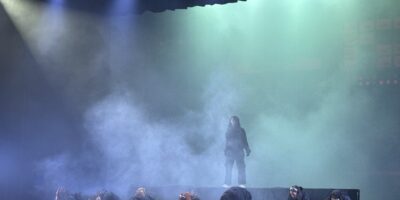Although this album came out over two months ago, and therefore cannot exactly be described as “new”, I was asked (possibly sarcastically) to write my first article for The Iron Warrior on Kanye West. I am more than happy to oblige, not only because he’s put together possibly the best six (or seven, if you count Watch the Throne) album run in the history of music, but also because he is my favorite artist ever.
How could Kanye ever hope to follow up his last record, 2010’s absolute classic My Beautiful Dark Twisted Fantasy? It nearly perfected gloriously detailed maximalism, with endless producers and collaborators, soaring vocals and wildly varying themes. If he were to make another album in the same vein, I’m sure it would be effortlessly great but also a bit derivative, especially for someone as creative as Kanye. So instead of just settling down and rehashing this technique, Kanye has done what he does best, in music or his personal life: he created something completely different, equally ugly and enthralling, a stark reminder that Kanye West is probably never going to settle down like us normal people. This record is his way of lashing out, against the media, against expectations, against himself and his new family.
Remember the opening to The College Dropout? A children’s choir giddily backing up Kanye in his introduction to the world. Late Registration? Adam Levine crooning overtop sparkling piano. MBDTF? A spoken word intro from Nicki Minaj and angelic harmonies. But then there’s Yeezus, whose opening track “On Sight” discards any notion of prettiness with huge, buzzing synths which careen wildly and abruptly drop out. In some ways, it’s a re-introduction, with Kanye erasing the persona he built for five albums to replace it with someone dark, disgusting, and captivating. In his own words “how much does he not give a ****” anymore? Little enough to insert one of his trademark soaring soul samples jarringly halfway into the song, only to have it swallowed up into the maw of those synths thirty seconds later. It seems symbolic, and I’m sure it was meant to be. Kanye always hinted he could be this raw and punishing, but until now had always hidden it with his shiny production flourishes. He successfully wipes that away after the first song.
The rest of the album proceeds in much of the same dark fashion, amalgamating elements of electro-, industrial (it was only a matter of time until Kanye found Throbbing Gristle) and most notably, a huge slathering of Jamaican dancehall. It is a deeply personal record (even though the songs titles – “Black Skinhead”, “New Slaves” – are politically charged), with Kanye reflecting most notably on his inability to form lasting relationships. As a note, this record came out a week before the birth of his first child.
Following up “On Sight,” we have “Black Skinhead,” which was debuted ferociously by Kanye on SNL. There, Kanye punctuated the huge Marilyn Manson drums with equally huge screams. On the album, however, the screams are muted, as is the first verse, which is still the most political on the album. Next comes “I Am a God,” which is a lot of the same, with a rumbling bass leading Kanye on his journey to massages, ménages, and even croissants. It’s less about Yeezy being a god than it is about letting everyone know how nice his human life is. Most notably though, “I Am a God” opens with a short, threatening verse from Jamaican dancehall artist Capleton, which Kanye merges seamlessly with the rest of the song. Regardless in the style departure of this album, Kanye’s production talent remains untouched.
After these first two songs, the sludgy production is gone, out mostly in favor of bleary electro and in-vogue trap courtesy of Hudson Mohawke. Kanye shows that he can still use his collaborators to the best of their ability even when he isn’t using twenty of them at a time. Bon Iver and Chief Keef (!) show up to sing a faded duet on “Hold My Liquor,” with Keef playing the role of sad, menacing gangster and Bon Iver lending his angelic falsetto to break the tension of the verses. In between, Kanye weaves a tale of a crashing relationship marred with substance abuse – “Still ain’t learn me no manners/you love me when I ain’t sober/you love me when I’m hungover” – and tension from outside family members: “Then her auntie come over/skinny b**** with no shoulders/telling you that I’m bogus/b**** you don’t even know us.” It is an extremely bleak song, and possibly the best on the album.
Later on, Kanye employs another Chicago upstart, King L, to lend a verse on “Send It Up”. L takes the opportunity by the horns, spitting possibly the best rap verse on the album. His dead-eyed delivery works perfectly with his tale of dropping out and pushing cocaine, which is juxtaposed well with Kanye’s story of excess and wealth. The song is also bookended by lines from another Jamaican dancehall great, Beenie Man. It’s telling that 2/3 of Kanye’s guests are products of the dangerous Chicago South Side’s drill scene, he’s trying to give his city a chance any way he can.
The other contender for best song on the album is “New Slaves” which is carried by little more than a pulsing steel drum. It is huge contradiction of a song, with Kanye wailing against new and old racism, corporatism, and the lifestyle which he himself leads. In spite of this, it’s thrilling, with lines like “Y’all throwin’ contracts at me/y’all know that n***** can’t read” delivered with such a rage that you can physically feel the disgust. Despite the heavy subject matter, Kanye keeps the pace up and things interesting at the end, when the song breaks at the seams and Kanye goes full 808s and Heartbreak mode with orchestral backing and a Frank Ocean wordlessly crooning over it all. In addition, “New Slaves” contains the best part scream-a-long lines of any song this year (with all respect to Future and his Bugatti): “F*** YOU AND YOUR HAMPTON HOUSE/I F***** YOUR HAMPTON SPOUSE”. Ouch.
Throughout the album, as I’m sure you’ve already heard, Kanye makes some questionable choices both lyrically and musically. Apart from the aforementioned croissants, he’s adding sweet and sour sauce to sexual acts with Asian women, using the Black Power fist for some decidedly less than moral activities, speaking Swag-hili, and using Nina Simone’s song about lynching (“Strange Fruit”) to underline a tale of adultery and MDMA. But you’ve got to remember, this is Kanye and it wouldn’t be a Kanye album without these missteps. They allow the listener to dive into the conflicted id of the one and only Kanye West. Kanye recently removed all his tweets from Twitter, and this is his Twitter now, uncensored and completely stream of consciousness. It’s marvelous and terrifying to behold.
Finally, there’s “Bound 2” containing a soulful Charlie Wilson sample which is pure old-school Kanye. It’s the light at the end of this tunnel, with Kanye finally letting up and allowing “And hey, we made it, Thanksgiving/Maybe we can make it to Christmas.” After thirty five minutes of hatred, dejection and immorality, he’s “bound to fall in love.” It’s as if after nine songs that were completely unlike anything we expected of Kanye before, he decides to reconcile with us, to let us know the old him won’t be gone forever. His cleansing is over, he endured his three days in Hell, and he has risen. Praise Yeezus.




Leave a Reply